【初中英语】一般将来时
初中英语语法一般将来时

初中英语语法一般将来时【初中语法系列】一般将来时,结构是重点!一般将来时是初二英语要研究的内容,在初中整个语法系统中占非常重要的内容,也是历次考试的高频考点.1一般将来时的含义一般将来时表示将来某个时间要发生的动作或状态,或将来经常发生的动作或状态。
2一般将来时的基本结构1. will/shall+动词原形will在陈述句中用于各种人称;shall用于第一人称,常被will所代替。
否定式:will not=won'tshall not=shan't一般疑问式:will/shall+主语+动词原形+其他?特殊疑问式:特殊疑问词+一般疑问式?I will/shall do a better job next time.下次我要做得好些。
Oil and water will not mix.油和水没法混在一起。
—Will he help you with your English tonight?今天晚上他会帮助你研究英语吗?—Yes, he will./No, he won't.是的,他会。
/不,他不会。
—When will you arrive for America?你什么时候去美国?—Tomorrow.来日诰日。
2. am/is/are going to +动词原形否认式:am/is/are not going to +动词真相普通疑问式:am/is/are +主语+ going to +动词真相+其他?特殊疑问式:特殊疑问词+普通疑问式?He is going to spend his holidays in London.他打算在伦敦度假。
Look at the dark clouds. There is going to be a storm.看那乌云,快要下雨了。
Is he going to collect any data for us?他会帮我们搜集数据吗?What are you going to do tomorrow?明天你打算作什么?3will+动词原形与am/is/are going to +动词原形的用法区别will+动词原形与am/is/are going to +动词原形的用法虽然都表示将来发生动作或情况,一般情况下能互换。
(完整版)初中英语语法一般将来时态

与一般将来时连用的时间状语
tomorrow 明天 the day after tomorrow 后天 soon 很快
this year 今年 next week 下周 in the future 将来
in three days 三天后
in ten minutes 在一般将来时 中用IN 表示在多久以后
What are they going to do this evening? They are going to watch TV.
What is the bear going to do tomorrow?
It is going to cook dinner.
What are they going to do ?
There will be only one country. 否定句:在will后面加not.
There won’t be only one country. 一般疑问句:把will提到there之前。
Will there be only one country? Yes, there will. / No, there won’t.
一般将来时的主要用法:
1、表示将来某一时刻的动作或状态: We will come to see you the day after tomorrow. There will be a wonderful show next week.
2、表示将来某一段时间内经常的动作或状态: The students will come and work in the lab once a
They will do heavy work.
They won`t do Will they do heavy work. heavy work?
初中英语 一般将来时课件(PPT18张)

Ⅳ.一般将来时的被动语态
一般将来时的被动语态表示“…将要被…”,其常用的表达形式有以下几种:
一般将来时被动语态:
will/shall + be /get done (表示意想不到的要发生的事情)
be going to be + done (表示按计划或安排发生的被动动作) be about to be + done (指将要发生的事情)
2.They ________ an English evening next Sunday. A. are having B. are going to have C. will having D. is going to have
3.—Tell him about the news when he _______, John.
考点2:考察一般将来时的不同表达方式
1.– Will his parents go to see the Terra Cotta Warriors tomorrow? – No, ________ (不去).
A. they willn’t. B. they won’t. C. they aren’t. D. they don’t.
基本结构:
1.主语+will/shall+do sth 2.主语+am/is/are+going to+do sth
3. 主表语示+位am移/is的/ar动e+词do可ing用s现th 在进行时表将来 4. 主特语定+时do间sth和条件状语从句可用一般将来时表将来
5.主语+am/is/are+(about)+to+do sth 注:之所以不用be是因为这是一般将来时,而be还包括过去式的 was、were
初中英语一般将来时专项语法讲解

初中英语一般将来时专项语法讲解-CAL-FENGHAI.-(YICAI)-Company One1一般将来时主要构成形式一般将来时表示将来某个时间要发生的动作,事情或存在的状态,也表示将来经常或反复发生的动作或事情。
1)will/shall+动词原形 shall用于第一人称,常被will 所代替。
will 在陈述句中用于各人称,在征求意见时常用于第二人称。
will not=won't shall not=shan't例如:Which paragraph shall I read first 我先读哪一段呢Will you be at home at seven this evening 今晚七点回家好吗2) be going to +不定式,表示将来。
a. 主语的意图,即将做某事。
例如:What are you going to do tomorro w 明天打算作什么呢b. 计划,安排要发生的事。
例如:The play is going to be produced next month。
这出戏下月开播。
c. 有迹象要发生的事。
例如:Look at the dark clouds, there is going to b e a storm. 看那乌云,快要下雨了。
3) be +不定式表将来,按计划或正式安排将发生的事。
例如:We are to discuss the report next Saturday.我们下星期六讨论这份报告。
4) be about to +不定式,意为马上做某事。
例如:He is about to leave for Beijing. 他马上要去北京。
注意:be about to do 不能与tomorrow, next week 等表示明确将来时的时间状语连用。
Notice:be to和be going tobe to 表示客观安排或受人指示而做某事,be going to 表示主观的打算或计划。
一般将来时-初中英语8大时态
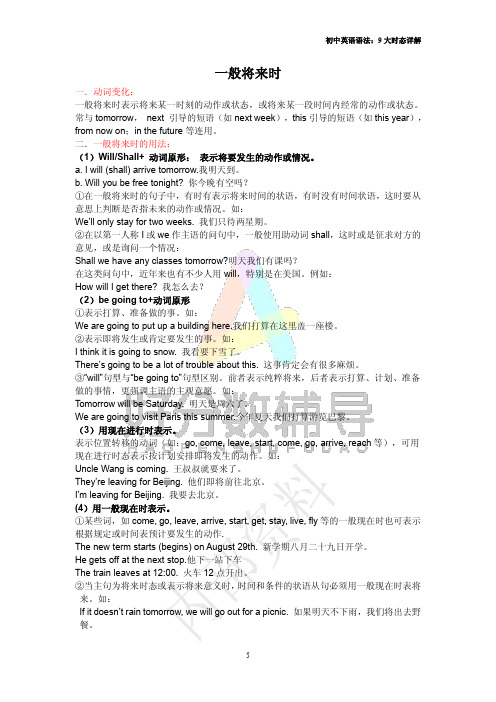
一般将来时一.动词变化:一般将来时表示将来某一时刻的动作或状态,或将来某一段时间内经常的动作或状态。
常与tomorrow,next引导的短语(如next week),this引导的短语(如this year),from now on;in the future等连用。
二.一般将来时的用法:(1)Will/Shall+动词原形:表示将要发生的动作或情况。
a.I will(shall)arrive tomorrow.我明天到。
b.Will you be free tonight?你今晚有空吗?①在一般将来时的句子中,有时有表示将来时间的状语,有时没有时间状语,这时要从意思上判断是否指未来的动作或情况。
如:We’ll only stay for two weeks.我们只待两星期。
②在以第一人称I或we作主语的问句中,一般使用助动词shall,这时或是征求对方的意见,或是询问一个情况:Shall we have any classes tomorrow?明天我们有课吗?在这类问句中,近年来也有不少人用will,特别是在美国。
例如:How will I get there?我怎么去?(2)be going to+动词原形①表示打算、准备做的事。
如:We are going to put up a building here.我们打算在这里盖一座楼。
②表示即将发生或肯定要发生的事。
如:I think it is going to snow.我看要下雪了。
There’s going to be a lot of trouble about this.这事肯定会有很多麻烦。
③“will”句型与“be going to”句型区别。
前者表示纯粹将来,后者表示打算、计划、准备做的事情,更强调主语的主观意愿。
如:Tomorrow will be Saturday.明天是周六了。
We are going to visit Paris this summer.今年夏天我们打算游览巴黎。
英语一般将来时讲解

一般将来时一、一般将来时定义:一般将来时表示将来某一时刻,或将来某一段时间内的动作或状态。
二、一般将来时两个招牌单词will/shall,shall用于第一人称单数,如:shall I…,I shallshall we 。
we shall will则通用三、基本结构will/shall + V原四、缩略形式will 常简略为'll,并与主语连写在一起,如:I'll,he'll,it'll,we'll,you'll,they'll。
例句:Will you be free tonight? 你今晚有空吗?We won’t(shan’t) be busy this evening. 我们今晚不忙。
He’ll go to London next weekWe’ll only stay for two weeks. 我们只待两星期。
We’ll go to the Great Wall if it is fine tomorrow.We shall have a delicious dinner tonight. 今晚我们将美餐一顿。
Shall we go to the park ,tonight ??Tomorrow will be Sunday. 明天就是星期天。
The rain will stop soon. 雨很快就要停了。
Shall we go there at five? 我们五点钟去那儿,好吗?Will you please open the door? 请你把门打开,好吗?五、用法基本用法:“助动词will或shall+动词原形”这一形式,表示将来发生的事情,用于征求对方的意见或表示客气的邀请。
在口语中will用于所有人称,书面语中第一人称常用shall。
如:I can see you're busy, so I won't stay long.我看得出你很忙,所以我不会呆太久。
(完整版)一般将来时初中语法
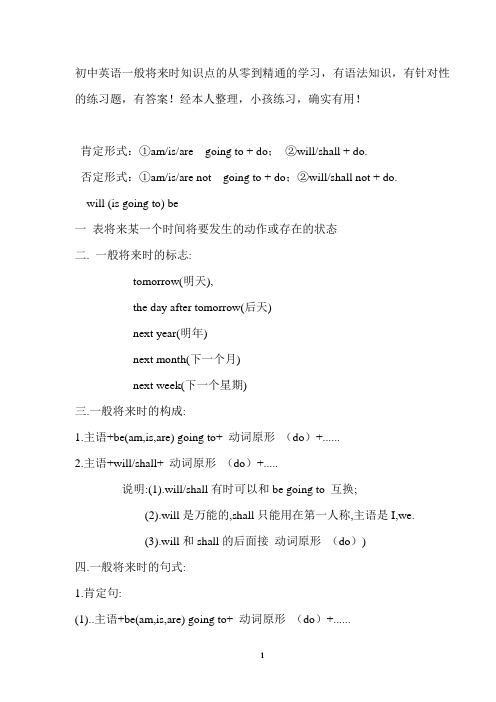
初中英语一般将来时知识点的从零到精通的学习,有语法知识,有针对性的练习题,有答案!经本人整理,小孩练习,确实有用!肯定形式:①am/is/are going to + do;②will/shall + do.否定形式:①am/is/are not going to + do;②will/shall not + do.will (is going to) be一表将来某一个时间将要发生的动作或存在的状态二. 一般将来时的标志:tomorrow(明天),the day after tomorrow(后天)next year(明年)next month(下一个月)next week(下一个星期)三.一般将来时的构成:1.主语+be(am,is,are) going to+ 动词原形(do)+......2.主语+will/shall+ 动词原形(do)+.....说明:(1).will/shall有时可以和be going to 互换;(2).will是万能的,shall只能用在第一人称,主语是I,we.(3).will和shall的后面接动词原形(do))四.一般将来时的句式:1.肯定句:(1)..主语+be(am,is,are) going to+ 动词原形(do)+......(2)..主语+will/shall+ 动词原形(do)+.....2.否定句:(1)..主语+be(am,is,are) not going to+ 动词原形(do)+......(2)..主语+will/shall not+ 动词原形(do)+.....3.一般疑问句:(1).Am/Is,Are+主语+going to+ 动词原形(do)+....(2).Will//shall+主语+ 动词原形(do)+...4.特殊疑问句:(1).What (Where, How...)+be (am,is,are)+主语+ going to + 动词原形(do)+...?(2). What (When,Where,How...) +will/shall+ 主语+ 动词原形(do)+...?二、基本结构:①be going to + do;②will+ do.三、否定句:在be动词(am, is, are)后加not或will后加not成won’t。
初中英语语法汇总(一般将来时)

初中英语语法汇总(一般将来时)初中英语语法汇总〔一般将来时〕一、一般将来时的定义一般将来时表示在如今看来即将要发生的动作或存在的状态。
常用时间副词tomorrow, soon或短语next year / week / month, in a few days, in the future, sometime 做状语。
二、一般将来时的基本用法及构成〔1〕一般将来时的基本用法是表示单纯的将来事实,由"will / shall + 动词原形'构成:〔shall只用于第一人称〕例句:We shall have a lot of rain next month. 下个月将下许多雨。
I think she will pass the exam. 我想他考试会及格的。
〔2〕"be going to+动词原形'用来表示事先考虑过的将要发生的动作以及已有迹象说明必将要发生的某事,意为"准备;就要'。
如:1. Were going to meet outside the school gate. 我们准备在校门口见面。
2. Look! Its going to rain. 瞧!快下雨了。
(3) 用"be to+动词原形'表示。
主要表示按打算或支配即将要发生的动作;有时也表示指令、禁止或可能性:He is to leave for Beijing tomorrow. 他确定明天去北京。
Tell him hes not to be back late. 告知他不准迟回。
(4) 用"be about to+动词原形'表示。
主要表示即将要发生的事:He is about to leave. 他即将要离开。
Sit down, everyone. The film is about to start. 大家坐好,电影马上就要开发始了。
注:该结构通常不与具体的时间状语连用:误:He is about to leave soon [tomorrow].另外,该结构在美国英语中还可表示"准备'(主要用于否认句):Im not about to lend him any more money. 我不准备再借给他任何钱。
完整)初中英语一般将来时
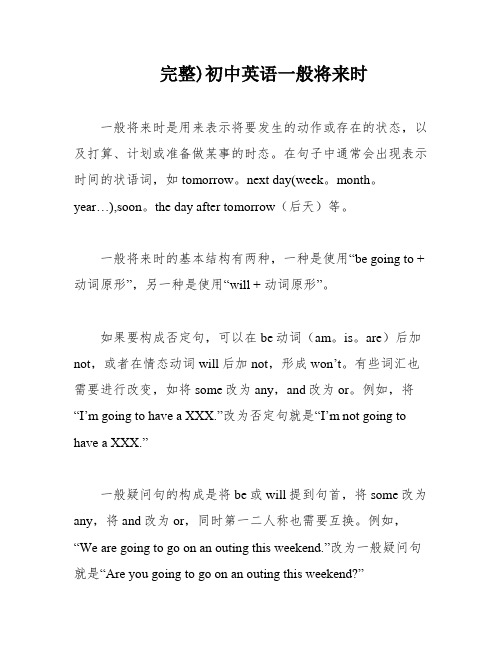
完整)初中英语一般将来时一般将来时是用来表示将要发生的动作或存在的状态,以及打算、计划或准备做某事的时态。
在句子中通常会出现表示时间的状语词,如tomorrow。
next day(week。
month。
year…),soon。
the day after tomorrow(后天)等。
一般将来时的基本结构有两种,一种是使用“be going to + 动词原形”,另一种是使用“will + 动词原形”。
如果要构成否定句,可以在be动词(am。
is。
are)后加not,或者在情态动词will后加not,形成won’t。
有些词汇也需要进行改变,如将some改为any,and改为or。
例如,将“I’m going to have a XXX.”改为否定句就是“I’m not going to have a XXX.”一般疑问句的构成是将be或will提到句首,将some改为any,将and改为or,同时第一二人称也需要互换。
例如,“We are going to go on an outing this weekend.”改为一般疑问句就是“Are you going to go on an outing this weekend?”对于划线部分的提问,一般将来时的对划线部分有三种情况。
第一种是问人,可以使用Who,例如“I’m going to New York soon.”改为问句就是“Who’s going to New York soon?”第二种是问干什么,可以使用What … do,例如“My father is going to watch a race with me this after noon.”改为问句就是“What is your father going to do with you this afternoon?”第三种是问什么时候,可以使用When,例如“She’s going to go to bed at nine.”改为问句就是“When is she going to bed?”同义句的构成是将be going to改为will,例如“I am going to go XXX.”可以改为“I will go XXX.”最基本的一般将来时结构是使用“will + 动词原形”,例如“XXX.”表示明天他们将要参观博物馆。
初中英语一般将来时
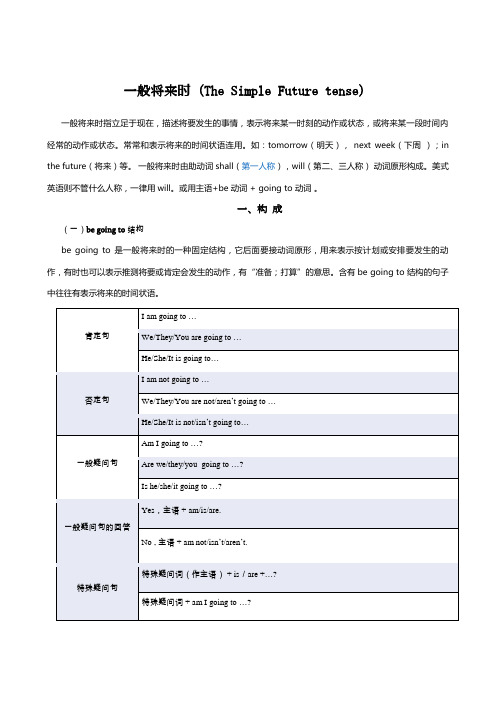
一般将来时(The Simple Future tense)一般将来时指立足于现在,描述将要发生的事情,表示将来某一时刻的动作或状态,或将来某一段时间内经常的动作或状态。
常常和表示将来的时间状语连用。
如:tomorrow(明天),next week(下周);in the future(将来)等。
一般将来时由助动词shall(第一人称),will(第二、三人称)动词原形构成。
美式英语则不管什么人称,一律用will。
或用主语+be动词+ going to 动词。
一、构成(一)be going to 结构be going to 是一般将来时的一种固定结构,它后面要接动词原形,用来表示按计划或安排要发生的动作,有时也可以表示推测将要或肯定会发生的动作,有“准备;打算”的意思。
含有be going to 结构的句子中往往有表示将来的时间状语。
I am going to move to another school next term.下学期我要搬到另一家学校。
He is not going to come to the get-together tomorrow. 他不打算参加明天的聚会了。
——Are they going to leave for Australia next week? 他们下周打算出发到澳大利亚吗?——Yes , they are. / No , they aren’t .是的。
/不。
What are you going to do this evening ?今晚你打算干什么?(二)will 结构I will finish all the housework very soon.我很快就会完成这些家务活。
They won’t move away until tomorrow.他们明天才搬走。
——Will Mr. white give us a lecture tomorrow ?史密斯先生明天给我们作讲座吗?——Yes, he will ./ No , he won’t .是的。
(完整版)初一下英语一般将来时

(完整版)初⼀下英语⼀般将来时第三讲:⼀般将来时⼀、定义:⼀般将来时表⽰将来某⼀时刻的动作或状态,或将来某⼀段时间内经常的动作或状态。
1.表⽰将来某⼀时刻的动作或状态:e.g. She will buy a new bike tomorrow.We will drive to the park next week.I shall visit my grandparents this weekend.They are going to play computer games this evening.I am going to have a big meal.2.将来某⼀段时间内经常的动作或状态:e.g. He is gong to have a big house next year .She will have a daughter.The cat will have a master.The dog will have a house.⼆、常与⼀般将来时连⽤的词:1. 时间状语系列:next Tuesdaynext weeknext yearthe coming Sundaythis afternoontomorrowtonightin a few minutesin the futurein five yearsfrom now onsoon三、⼀般将来时的构成1. will/shall的⼀般将来时构成:主语 + will/shall + 动词原形+其它I will/shall go to Beijing next week.主语是第⼀⼈称时 ----- shallwill not = won’tshall not= shan’t【活学活⽤】按照要求改写句⼦1、My teacher will teach us next term.(改为否定句)___________________________________________ 2、I shall not buy new clothes this month.(改为肯定句) ___________________________________________ 3、She is playing computer games.(改为将来时)___________________________________________ 4、We shan't take part in the football match.(改为肯定句) ___________________________________________ 5、I visit my grandparents every weekend.((改为将来时) ___________________________________________ 2. be going to的⼀般将来时构成:主语+ be going to + 动词原形+ 其他She is going to play basketball this afternoon.主语是”I”时 ----- am主语为单数时 ----- is主语为复数及you时 ----- are否定句的构成: 主语 + be not going to + 动词原形+ 其他She is not going to play basketball this afternoon.is not = isn’tam not = ’m notare not = aren’twill或shall与be going to区别:1. will或shall⽤法总结:1)表⽰⼀个将来的动作或状态,“要…,会…”She will go to the park tomorrow.2)表⽰不以⼈的意志为转移的⾃然发展的事。
英语一般将来时
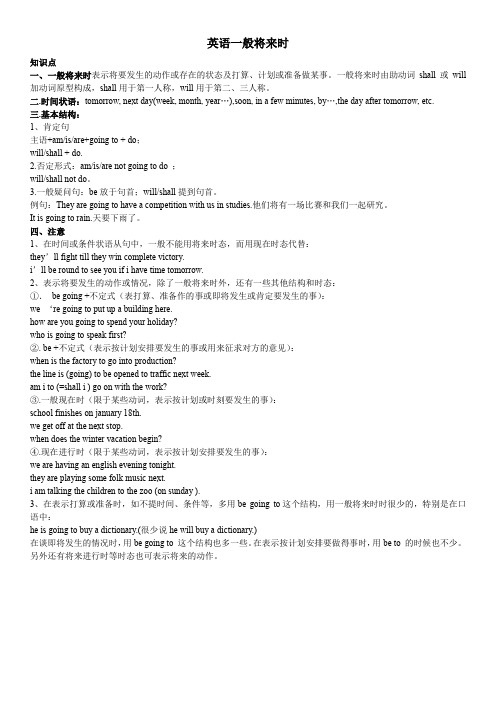
英语一般将来时知识点一、一般将来时表示将要发生的动作或存在的状态及打算、计划或准备做某事。
一般将来时由助动词shall或will 加动词原型构成,shall用于第一人称,will用于第二、三人称。
二.时间状语:tomorrow, next day(week, month, year…),soon, in a few minutes, by…,the day after tomorrow, etc.三.基本结构:1、肯定句主语+am/is/are+going to + do;will/shall + do.2.否定形式:am/is/are not going to do ;will/shall not do。
3.一般疑问句:be放于句首;will/shall提到句首。
例句:They are going to have a competition with us in studies.他们将有一场比赛和我们一起研究。
It is going to rain.天要下雨了。
四、注意1、在时间或条件状语从句中,一般不能用将来时态,而用现在时态代替:they’ll fight till they win complete victory.i’ll be round to see you if i have time tomorrow.2、表示将要发生的动作或情况,除了一般将来时外,还有一些其他结构和时态:①.be going +不定式(表打算、准备作的事或即将发生或肯定要发生的事):we ‘re going to put up a building here.how are you going to spend your holiday?who is going to speak first?②. be +不定式(表示按计划安排要发生的事或用来征求对方的意见):when is the factory to go into production?the line is (going) to be opened to traffic next week.am i to (=shall i ) go on with the work?③.一般现在时(限于某些动词,表示按计划或时刻要发生的事):school finishes on january 18th.we get off at the next stop.when does the winter vacation begin?④.现在进行时(限于某些动词,表示按计划安排要发生的事):we are having an english evening tonight.they are playing some folk music next.i am talking the children to the zoo (on sunday ).3、在表示打算或准备时,如不提时间、条件等,多用be going to这个结构,用一般将来时时很少的,特别是在口语中:he is going to buy a dictionary.(很少说he will buy a dictionary.)在谈即将发生的情况时,用be going to 这个结构也多一些。
初中英语--一般将来时
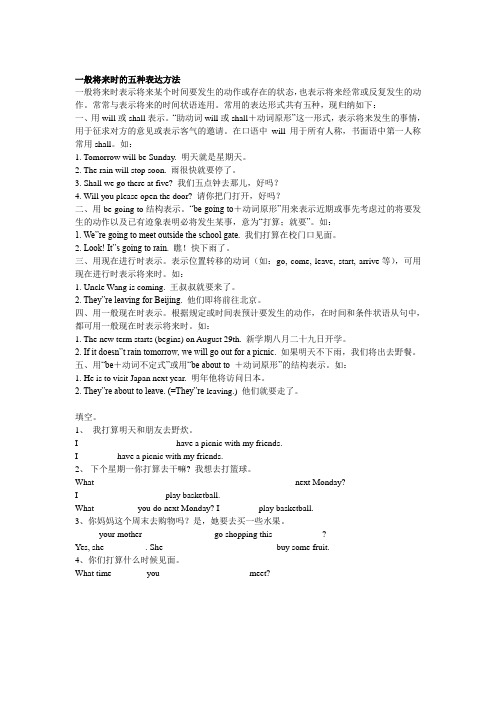
一般将来时的五种表达方法一般将来时表示将来某个时间要发生的动作或存在的状态,也表示将来经常或反复发生的动作。
常常与表示将来的时间状语连用。
常用的表达形式共有五种,现归纳如下:一、用will或shall表示。
“助动词will或shall+动词原形”这一形式,表示将来发生的事情,用于征求对方的意见或表示客气的邀请。
在口语中will用于所有人称,书面语中第一人称常用shall。
如:1. Tomorrow will be Sunday. 明天就是星期天。
2. The rain will stop soon. 雨很快就要停了。
3. Shall we go there at five? 我们五点钟去那儿,好吗?4. Will you please open the door? 请你把门打开,好吗?二、用be going to结构表示。
“be going to+动词原形”用来表示近期或事先考虑过的将要发生的动作以及已有迹象表明必将发生某事,意为“打算;就要”。
如:1. We”re going to meet outside the school gate. 我们打算在校门口见面。
2. Look! It”s going to rain. 瞧!快下雨了。
三、用现在进行时表示。
表示位置转移的动词(如:go, come, leave, start, arrive等),可用现在进行时表示将来时。
如:1. Uncle Wang is coming. 王叔叔就要来了。
2. They”re leaving for Beijing. 他们即将前往北京。
四、用一般现在时表示。
根据规定或时间表预计要发生的动作,在时间和条件状语从句中,都可用一般现在时表示将来时。
如:1. The new term starts (begins) on August 29th. 新学期八月二十九日开学。
2. If it doesn”t rain tomorrow, we will go out for a picnic. 如果明天不下雨,我们将出去野餐。
一般将来时
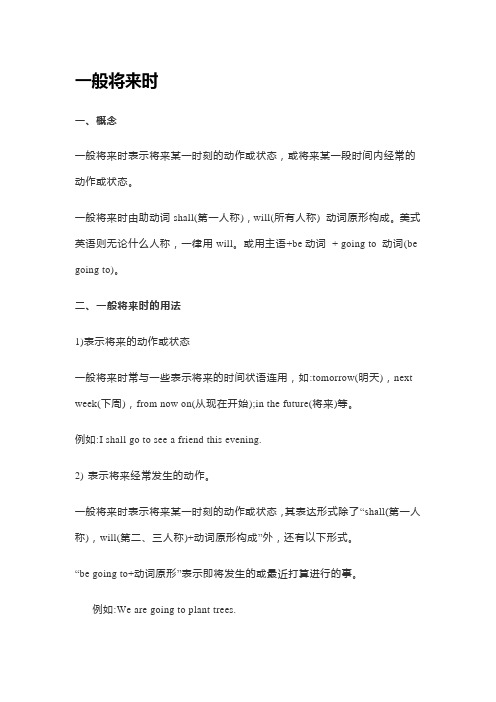
一般将来时一、概念一般将来时表示将来某一时刻的动作或状态,或将来某一段时间内经常的动作或状态。
一般将来时由助动词shall(第一人称),will(所有人称) 动词原形构成。
美式英语则无论什么人称,一律用will。
或用主语+be动词+ going to 动词(be going to)。
二、一般将来时的用法1)表示将来的动作或状态一般将来时常与一些表示将来的时间状语连用,如:tomorrow(明天),next week(下周),from now on(从现在开始);in the future(将来)等。
例如:I shall go to see a friend this evening.2)表示将来经常发生的动作。
一般将来时表示将来某一时刻的动作或状态,其表达形式除了“shall(第一人称),will(第二、三人称)+动词原形构成”外,还有以下形式。
“be going to+动词原形”表示即将发生的或最近打算进行的事。
例如:We are going to plant trees.三、一般将来时的句型①肯定句:主语+ be going to do /will/shall+ 动词原形②否定句:主语+ be not going to do /will not/shall not+ 动词原形③疑问句:Be动词+主语+ going to do /Will/Shall+主语+ 动词原形简略回答:(肯)Yes,主语shall/will (否) No,主语+shan't/won't④特殊疑问句:特殊疑问词+一般疑问句(就主语提问时,以疑问词who开头的疑问词除外)----- Why will you be here on Sunday?(周日你为什么将要在这儿?)-----I will have a meeting on Sunday(我将要在周日举行一个聚会)(对特殊疑问句要进行具体回答)一般疑问句:be或will提到句首,some改any,and改or,第一二人称互换We are going to go on an outing this weekend.-------Are you going to go on an outing this weekend?被动句:will/shall+be+v.ed(及物动词过去分词)The letter will be sent tomorrow.这封信明天将寄出去We shall be punished if we break the rule.如果我们违反规定,我们将受到惩罚。
- 1、下载文档前请自行甄别文档内容的完整性,平台不提供额外的编辑、内容补充、找答案等附加服务。
- 2、"仅部分预览"的文档,不可在线预览部分如存在完整性等问题,可反馈申请退款(可完整预览的文档不适用该条件!)。
- 3、如文档侵犯您的权益,请联系客服反馈,我们会尽快为您处理(人工客服工作时间:9:00-18:30)。
【初中英语】一般将来时一、初中英语一般将来时1.If you go to bed earlier, you tired in the morning.A. will feelB. don't feelC. won't feelD. didn't feel【答案】 C【解析】【分析】句意:如果你上床睡觉早些,在早上你就不会感觉到累了。
此题考查if 引导的条件状语从句,主句一般将来时,从句用一般现在时。
根据句意,故选C。
【点评】考查动词时态。
掌握主将从现的句子结构。
2.In the near future, there ________ self-driving cars in our city.A. isB. wasC. areD. will be【答案】 D【解析】【分析】句意:在不久的将来,我们城市将会有自动驾驶汽车。
根据In the near future,可知时态是一般将来时,there be结构的一般将来时为:there will be,故选D。
【点评】考查时态,注意there be结构的一般将来时为:there will be的用法。
3.— Summer holiday is coming. What are you going to do?— I'm not sure. Maybe I to the beach.A. goB. wentC. will goD. have gone【答案】 C【解析】【分析】句意:一一暑假要来了,你打算做什么?一一我不确定,可能我要去海滩。
A.一般现在时态,表示经常性、习惯性的动作;B.一般过去时态,表示过去发生的动作;C.一般将来时态,表示将要发生的动作;D.现在完成时态,强调过去发生的动作对现在造成的影响或结果.本题谈论的是暑假的计划,谈论将来,用一般将来时态。
故选C。
4.I'm not sure if Lily_______ me. If I _______, I will go with you.A. will invite, will be invitedB. will invite, am invitedC. invites, will inviteD. invites, invite【答案】 B【解析】【分析】句意:我不知道他是否会邀请我,如果我被邀请,我将和你一起去。
题文出现两个从句,第一个是if引导的宾语从句,第二个是if引导的条件状语从句。
根据句意,宾语从句应用一般将来时,条件状语从句中,主句用一般将来时,从句用一般现在时。
故选B。
【点评】考查动词的时态和语态。
5.Hold your dream,_____ you might regret some day.A. andB. orC. butD. so【答案】 B【解析】【分析】考查连词.句意:坚持你的梦想,___有一天你会后悔的。
A和,表示并列关系,B否则、或者,C但是,表示转折关系,D所以,表示因果关系。
结合语境可知,用or否则,选B.6.I wonder when they ________ for Beijing. I will go to the train station to see them off when they ________.A. will leave; leaveB. leave; will leaveC. go; leaveD. will go; leave【答案】 A【解析】【分析】句意:我想知道他们什么时候去北京。
当他们离开的时候,我将去车站送他们。
leave for,动身前往,去……。
第一句话是宾语从句,因此从句可以使用一般将来时,第二句是when引导的时间状语从句,应遵循主将从现的原则,因此应使用一般现在时,故答案是A。
【点评】考查动词辨析和时间状语从句中的主将从现原则。
注意识记固定搭配leave for,同时只要记住在时间状语从句中的主将从现原则。
7.There ___________ a meeting tomorrow afternoon.A. will be going toB. will going to beC. is going to beD. will go to be【答案】 C【解析】【分析】句意:明天下午将有一次会议。
根据时间状语tomorrow afternoon 可知这里应该是there be结构的将来时:there will be或there is going to be,根据句意,故答案为C。
【点评】考查be going to表示按计划,安排将要发生的事。
注意掌握一般将来时的构成,意义和用法。
8.I don't know if my brother _____________ here tomorrow. If he _____________, I'll call you.A. comes; comesB. will come; comesC. comes; will comeD. will come; will come【答案】 B【解析】【分析】句意:我不知道是否我哥哥明天将来,如果他来,我将给你打电话。
第一个句子中if意思是是否,tomorrow表明时态是一般将来时,所以用will come;第二个句子中if 意思是如果,引导条件状语从句,从句用一般现在时,主句用will+动词原形,句子是从句,所以用一般现在时,主语是he,所以用comes,故选B。
【点评】考查一般将来时和条件状语从句,注意平时识记if的用法,理解句意。
9.If it is clear tomorrow , I ________a bike to the underground station.A. rideB. will rideC. rodeD. have ridden【答案】 B【解析】【分析】句意:如果明天天气好的话,我会骑自行车去地铁站。
ride骑车,动词原形;will ride是一般将来时态;rode是ride的过去式形式;have ridden是现在完成时态。
句中if引导的是条件状语从句,从句中一般现在时态,主句应使用一般将来时态,故应选B。
【点评】考查动词的时态,以及if引导的是条件状语从句,从句中一般现在时态,主句应使用一般将来时态。
10.—Tom wants to know if you ________ a picnic next Sunday.—Yes. But if it ________, we'll visit the museum instead.A. will have; will rainB. have; rainsC. have; will rainD. will have; rains 【答案】D【解析】【分析】句意:汤姆想知道下周日你们是否去野炊。
是的,但是如果下雨的话,我们将改去参观博物馆。
if引导宾语从句时,意为“是否”,句子时态根据句意选用,if 作为“假如”时,引导的是条件状语从句,主句用一般将来时,从句用一般现在时表示将来,故选D【点评】此考点也是中考最喜欢出现的考点,if除了可以引导条件状语从句外,还可以引导宾语从句,翻译成“是否”。
引导宾语从句时没有“主将从现”的说法。
除了if外,还有when, as soon as也一样要注意“主将从现”。
11.—Could you please tell me _______?—Next week.A. when he comes backB. when does he come backC. when he will come backD. when will he come back【答案】 C【解析】【分析】句意:——请问你能告诉我他什么时候回来吗?——下周。
考查宾语从句,宾语从句应使用陈述语序,故排除BD,根据答语next week,可知从句应使用将来时,故答案是C。
【点评】考查宾语从句,注意宾语从句应使用陈述语序,同时应注意根据答语内容确定问句的内容或者时态。
12.— Have you watched the new movie Jurassic World, Steven?— Not yet. I ________ it with my cousin this evening.A. will watchB. was watchingC. watchedD. have watched【答案】 A【解析】【分析】句意:你看过《侏罗纪世界》这部新电影吗,史蒂文? ——没有。
今晚我要和我的表弟一起看。
其中watch movie意思是看电影,因为this evening 时间是今晚,动作将要进行,所以用将来时。
故选A。
【点评】考查时态。
13.We____ shopping unless it ____ tomorrow.A. will go, will rainB. go, will rainC. will go, rainsD. go, rains【答案】C【解析】【分析】句意:除非明天下雨,否则我们将会去购物。
unless 除非,引导条件状语从句,从句中应该用一般现在时表示将来,主句用一般将来时。
故应选C。
【点评】考查动词时态。
14.The kids may not go to school in the future.They____at home on computers.A. have studiedB. will studyC. studied【答案】B【解析】【分析】句意:孩子们将来可以不上学。
他们在家电脑上学习。
A.have studied 现在完成时态,表示已经发生或完成的动作;B.will study即一般将来时态,表示将要发生的动作;C. studied一般过去时态,表示过去发生的动作。
将来在家里、在电脑上学习,用一般将来时态。
故选B。
15.We ______ some robots at home in the future, and there _____ some in the office, too.A. will have; will haveB. have; will beC. will have; will beD. will have; are 【答案】 C【解析】【分析】句意:在将来, 我们在家里将会拥有机器人, 在办公室里也将会有。
本题考查的是一般将来时的用法, in the future的意思是在将来, 是一般将来时的时间标志, 因此应该用一般将来时, 第二句话是一个There be句型, 因此不能用will have, 排除后, 故选C。
